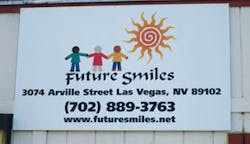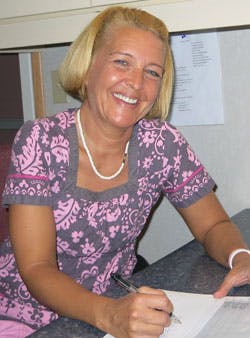The business of public health dental hygiene endorsement Hygienist develops Nevada outreach effort in public health settings
by Noel Brandon Kelsch, RDHAP, BS
When people meet Kelly Taylor there is one thing for sure -- they'll have the opportunity to understand passion and unconditional giving. Kelly said, "Bonuses are great, and getting paid well is a plus, but if you ask me to choose minimum wage and the smile of an underserved child that I've had a small part in creating, there is no doubt I would choose the child." After talking with Kelly, there is no doubt in my mind that her statement is true.
Kelly Taylor has spent her career not only giving her patients in the dental office a dental home, but also going beyond those four walls and creating dental homes in the community as a volunteer. She has expanded her license and is living that dream in a creative setting.
Kelly is living her mission statement, "Increase access to preventive oral health care for at-risk children. Motivate and educate people to take responsibility for their own medical and dental health." Kelly has taken her career to another level by receiving a special license under her RDH license in the State of Nevada called a Public Health Dental Hygiene Endorsement (PHDHE) with the public health, nonprofit organization, Future Smiles.
---------------------------------------------------------
Other articles by Kelsch
- Kiancare: An RDHAP visits homes to give clients access to care
- 15 minutes, tea, and varnishes
- Diversion And Addiction among dental professionals
---------------------------------------------------------
This PHDHE has allowed Kelly to work with a nonrestricted license that allows her to reach out to schools, health fairs, and people with housing challenges to provide screenings, education, prophylaxes, sealants, fluoride treatments, and more. Last year the program was able to reach 2,608 underserved children (placing 3,199 dental sealants, 1,940 fluoride applications, and 942 prophylaxes) with a model that meets not only their oral prevention needs, but also their challenges in obtaining care.
Kelly says she coordinates a "traveling show," and in watching her execute moving inventory, rolling chairs, and manning carts, she is truly a moving company. The model that Kelly and Future Smiles embrace includes a stationary office called an "EPOD," School-Based Health Center for Education and Prevention of Oral Disease, and a mobile office that serves 12 schools for children ages 3-19 or until graduation.
Funding and public support
Kelly shared some of the methods that Future Smiles has used to support program operations. First, be creative in your search for funding, and second, be persistent. Programs need to constantly be searching for funding opportunities.
Kelly and her Future Smiles team members are great at getting buy-ins from program partners. They share the staggering need for dental care in at-risk children, and the financial challenges the program faces as it fulfills its mission to ensure optimal oral health in vulnerable children. They reach out to many organizations and groups that others may skip. These include:
- School faculty members and boards of trustees -- Attend school board meetings and events where school nurses, counselors, and teachers may hear about the program. Share with them how you can improve the health of a child, and that prevention is a great return on investment that saves money (lower cost than restorative dentistry) and decreases missed days of school.
- Principal and administrators -- Go to individual principals and ask for statistics. Help them understand the impact of poor oral health and how it can relate to student achievement (test scores/performance) and how their endorsement and support of the program can open doors to new schools.
- There are many wonderful online grants to support oral health care for the needy. Recently, Future Smiles was awarded a community grant from CVS Caremark Foundation, and it has been a Wrigley Foundation recipient.
- Reach out to surrounding businesses, clubs, women's groups, United Way, Catholic Charities, and other philanthropic organizations that want to invest in improving the well-being of the community. Future Smiles, based in Las Vegas, has been fortunate to receive a grant from a local casino, Golden Nugget Hotel and Casino.
In 2005, Communities in Schools Nevada created the School-Based Health Center at Cunningham Elementary School, which included a dental operatory. It is this dental operatory that became the first clinical site for Future Smiles. Through grants from oral health advocates such as Oral Health America, Future Smiles began serving the community in 2009. As a school-based program, they bring dental hygiene treatment directly to the children, eliminating many of the roadblocks to care such as the need for parents to leave work and transportation issues. The business model uses many of the tools used in a dental office, such as Dentrix for electronic records and Medicaid billing.
Kelly said she feels the very essence of this model is that every child should have a dental home and a support system that endorses and provides prevention as well as care. All patients are placed in the recall system according to their oral health needs.
Some of the great additions that have been implemented are incorporated systems that meet the financial challenges that many patients face by securing grants that support the program (services for the uninsured), and serving Medicaid enrolled patients. Additionally, Family Ties, a social service program, provides technical assistance to help uninsured families that qualify for Medicaid enroll in the Medicaid system.
The program works diligently to see that all children in need of restorative dentistry find resources to fulfill their unmet needs by referral to a dental partner, Children's Dental International and UNLV School of Dental Medicine. In cases of general medical needs, the program uses referrals to local agencies such as Positively Kids, Helping Kids, and Volunteers in Medicine. No children are turned away because they do not have insurance or funding.
The organization is dedicated to making access to care a reality in this community. Kelly's license and work ethic are helping make that goal a reality. One of the strongest components of the business plan is that families become involved in setting oral health goals and taking ownership of their oral health.
Rewards
Kelly stated, "It is my duty to give back to the community. I have been given so much." She shared the story of a child who repeatedly missed school and seldom spoke or participated in the classroom because of rampant tooth decay. The child's parents where unaware of the severity of the disease, the options for treatment, and culturally had a fear of authorities.
When Kelly met with the family, the mother was so frightened that she trembled. Kelly spent much of the appointment reassuring and educating the mother, grandmother, and child. After a series of appointments and the help of dentists that Kelly worked with, it was a pleasure for Kelly to see the child interacting on the playground, talking, laughing, smiling, and greeting her, "Miss Kelly, Miss Kelly!" "It is such a pleasure and reward to see what an impact a hygienist's skills can have on a life in this setting," she said.
Kelly's vision includes allowing increased access to dental hygienists in all venues for all populations through modification of supervision levels. She can see a future of independent hygienist ownership that has been successful in other states (such as Colorado and California) and similar professions such as nursing.
If you would like to donate to the nonprofit organization, 501 (c)(3), or give of your time, visit the Future Smiles website at www.futuresmiles.net.
NOEL BRANDON KELSCH, RDHAP, is a syndicated columnist, writer, speaker, and cartoonist. She serves on the editorial review committee for the Organization for Safety, Asepsis and Prevention newsletter and has received many national awards. Kelsch owns her dental hygiene practice that focuses on access to care for all and helps facilitate the Simi Valley Free Dental Clinic. She has devoted much of her 35 years in dentistry to educating people about the devastating effects of methamphetamines and drug use. She is a past president of the California Dental Hygienists' Association.
Six tips from Taylor about a mobile office
1. Be a minimalist -- If you have it, you must move it. Learn to pack light and buy lightweight instruments. Put together enough supplies for the week and return to resupply as soon as possible.Past RDH IssuesKiancare









